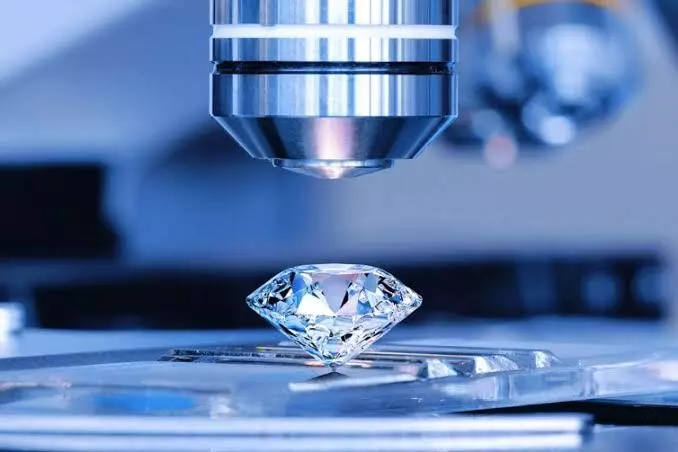Lab-grown diamonds gain ground as young shoppers seek affordable luxury
Mass production and low cost are helping lab-grown diamonds capture the market
By Manish Pachouly
Lab-grown diamonds gain ground as young shoppers seek affordable luxury
Hyderabad: ‘Diamonds are forever.’ The saying has been associated with the precious stone for many years. However, a new slogan, ‘diamonds for all’, is capturing the market fast, indicating its easy reach to the common masses.
The new slogan has started gaining popularity with diamonds now affordable to a large population, at as low as one-tenth the price. The transformation is not due to any change in the cost of the stone, which has so far been popular largely among the rich and elite. The affordability is owing to the mass production of lab-grown diamonds (LGDs) that have the same quality as natural ones.
From billions of years to a few weeks
Though the natural ones take billions of years for formation deep below the Earth’s crust under intense pressure and temperature, the man-made diamonds are manufactured within a few weeks using the same conditions in the laboratory. The price of natural diamonds is high because of their rarity, whereas the lab-grown ones are available in bulk within weeks.
Even though natural diamonds are still seen to be superior and have emotional value for many, the increasing popularity of LGDs due to the low price has led to the opening of a large number of laboratories in the country, especially in Surat, Gujarat.
When the lab-grown diamonds started to gain popularity around 2010, it’s pricing was 30 per cent of the natural ones as there were few laboratories and the production was not as much as it is now. With the surge in its demand, the number of laboratories also went up significantly, leading to increased production. The technological advancement also led to mass production of LGDs at a lower cost but with improved finesse, resulting in a sharp decline in the price, which is now merely around 10 per cent of natural diamonds.
Deciding to spend Rs 40 lakh or Rs 1.6 lakh
‘Lab-grown diamonds are becoming popular because they look the same as the natural ones and nobody can make out the difference with the naked eye,’ said diamond market expert Hardik Hundiya, who used the slogan ‘heera hai sada ke liye’ (diamond is forever) in 2020 when he introduced an award called Kohinoor of India through his magazine ‘International Diamond Day’. Hundiya and his team honour and give awards to diamond merchants and others who have made their names in their respective fields and have done something good for the country. With the growing popularity of the LGDs, Hundiya came out with a slogan, ‘heera hai sabhi ke liye’ (diamond is for all), two years back.
Giving an example of the growing popularity of LGDs, Hundiya said that a businessman wanted to gift two rings to his wife. ‘He went to inquire the cost of the two rings with natural diamonds, and it came to Rs 40 lakh,’ said Hundiya. He went to another jewellery shop to inquire about the cost of similar rings having lab-grown diamonds. ‘The cost plummeted to Rs 1.6 lakh for the two rings, and he had no second thoughts to buy them,’ said Hundiya, adding that he did not tell his wife what type of diamonds were in the ring.
What is the market sentiment for LGDs?
In the coming years, the demand for LGDs is going to rise further, say many market experts. According to investment promotion agency iNDEXTb, the global market for LGDs, which was valued at US$23,898.6 million in 2022, is expected to expand at a compound annual growth rate (CAGR) of 8.64 per cent and will reach US$39,301.2 million by 2028.
As compared to this, the lab-grown diamond jewellery sales in India, which were valued at US$299.9 million in 2023, are expected to rise at 14.8 per cent CAGR to reach US$1,192.3 million by 2033.
Environmental and ethical reasons are driving young customers to LGDs
Among the reasons behind the increasing demand for LGDs is their popularity among the young generation, as well as among those who cannot afford natural diamonds. Besides, the diamond lovers among the environment enthusiasts also prefer LGDs as they are deemed to be causing much less environmental hazard as compared to natural diamonds. The diamond mining (to extract natural stones) is said to be creating much more carbon dioxide emission than the manufacturing of LGDs. Besides, the mining also produces sulphur dioxide and consumes a huge amount of water.
Another consideration is associated with the ethics among those avoiding natural diamonds. Such people associate it with conflict diamonds as they firmly believe that their mining is done in war zones, and the monetary proceeds are used for funding insurgency.
Largest base for natural diamond lovers
However, despite the losing shine, natural diamonds still have loyal customers mainly among the rich and elite who are not willing to compromise on the emotional value and like them because of their rarity, uniqueness and also because they are timeless.
Hundiya said that the rich class still prefer natural diamonds and don’t go for lab-grown ones. ‘Those who want to fulfil the desire to wear diamonds but cannot afford them, go for the lab-grown ones,’ he said. Hundiya, however, added that India has the largest natural diamond lovers in the world.